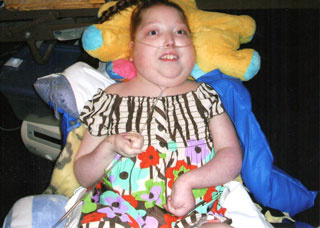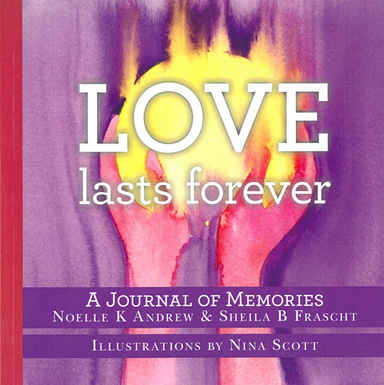Love Lasts Forever: A Journal of Memories isn’t like other baby books or children’s memory journals. It’s not for parents to fill out as their children grow and mature, with hopes of passing it on as that child has children of his or her own.
This journal is different.
Love Lasts Forever is for a group no parent ever wants to be part of—those parents who have lost a child.
•••••
“If she hadn’t been such a beacon of light, life, love, and hope, perhaps I wouldn’t be so aware of the darkness.”
—Mindy Kankel, mother of Mari
Mari Kankel was just six weeks old when doctors at UI Children’s Hospital discovered three major abnormalities in the little girl’s heart. The prognosis wasn’t good—though they weren’t sure how long, doctors knew Mari’s life would not be a long one. They prepared her parents for the worst.
“When we finally knew the depth and degree of Mari’s medical issues, we were very conscious all that time of bringing up our other kids in an atmosphere of being able to love her and to accept her,” says Mari’s mom, Mindy. “I wanted them to understand how serious the situation was, what a fine line their sister walked, and that we would navigate it as a family.”

She said she realized that the chronic nature of Mari’s medical conditions and needs would be difficult for her siblings, as well, and worried that they might get angry, scared, or resentful at the extra attention Mari required, and also with the stress of frequent hospitalizations and the uncertain outcomes. She and her husband let them know it was OK to have those feelings and to express them. She hoped that the family unit would remain strong if everyone clearly understood what was at stake. Mari’s fight became the family’s fight. Even more, though, it became Mindy’s fight.
“As I look at the final part of Mari’s journey, what was interesting was that the rest of my family seemed to be more prepared and more in tune to the idea that this was probably the end of Mari’s life, more than I was, and I was her primary caretaker,” Mindy recalls. “I had become so close to it, I really felt that my sense of purpose was tied to hers. As long as she continued to give me the sign, as long as she continued to let me know that she wanted to keep on fighting, then I would do what I could to let that happen.”
Mari had seven open-heart surgeries before her second birthday, followed by numerous surgeries and procedures over the next several years. With every open-heart surgery, doctors told her parents she had a 50 percent chance of surviving. She went into cardiac arrest at least twice. Many doctors didn’t think Mari would live past her seventh birthday.
Mari died on Nov. 11, 2010, two months shy of her 16th birthday.
•••••
“A wife who loses a husband is called a widow. A husband who loses a wife is called a widower. A child who loses his parents is called an orphan. But … there is no word for a parent who loses a child; that’s how awful the loss is.” —Neugeboren, 1976
Love Lasts Forever: A Journal of Memories was written by two members of the pediatric palliative care team at University of Iowa Children’s Hospital, Sheila Frascht and Noelle K. Andrew. Frascht, a former pediatric intensive care nurse, is developer and coordinator of the Grief Services Program and a certified hospice and palliative pediatric nurse. Andrew, a former church pastor, has served as the UI Children’s Hospital pediatric chaplain for more than four years.
The two women have spent countless hours with families as they’ve grieved, as they’ve prepared to say goodbye to a child, and as they’ve struggled to find the words of comfort and support for each other and for themselves. Frascht was one of the first nurses to care for Mari in the Pediatric Intensive Care Unit. She and Andrew have helped find resources for mothers, fathers, siblings, and grandparents to help them move forward.
It was in that search for resources that the women found a hole, a necessary resource that couldn’t be found.
“There were all these books that addressed all these different issues, but we couldn’t find a journal that allowed families to really celebrate their child’s life as well as reflect on their child’s death,” Frascht says. “You have a baby book for when your child lives, but what about the memories you want to hold onto when your child doesn’t live?”
“I remember saying at one point, ‘If we can’t find it, why don’t we just make it?’” she recalls.
And so they did.
Love Lasts Forever: A Journal of Memories is a book the two women collaborated on as a journal for families who have lost children. For Frascht and Andrew, creating the book meant completing that comfort package—that group of materials to turn to for information—for a grieving family, providing that last outlet for them to record those special moments with or about their child.
“I’m always just in awe of how a stranger invites us into their world,” Andrew says. “They invite us into a part of the world they don’t want to be a part of.”
“We both have cried with families, we have been disappointed and sad and angry,” she says. “We’re trying to be a lifeline for them in a time of uncertainty.”
“This journal gives them a framework to place their thoughts, their memories, to write things they’re going to want to remember,” says Andrew. “It creates a legacy for their child.”
The book offers journal entry pages for such things as “A Beautiful Hello,” and “How You Embraced Life,” but also for things parents may wonder in later years, such as “Questions I Want to Ask You” and “Special Days We Remember You.” There is an entry page for the day parents and child had to say goodbye.
Many of the pages have quotes from families whose children were patients at UI Children’s Hospital before they passed away.
It offers an outlet for parents and grandparents to say what they need to say, to write what they don’t think anyone else will understand. To record the memories they don’t want to forget.
“I think it has the potential to engage those very broken hearts that never have any closure,” Andrew says.
•••••
“I am forever blessed and made better by my beautiful granddaughter who did not do a deed. She just ‘was’ in all of her divine love, innocence, and beauty. Knowing her changed me forever.” —Kim Felhafer, grandmother of Cecelia
Felhafer awaited with nervous anticipation the birth of her first grandchild. Her daughter, Anna Barnts, had had a fairly normal pregnancy throughout her first 30 weeks.
“The only abnormality that we saw was that Anna was really big, we thought this baby was going to be a really big baby,” Felhafer recalls.
A few weeks later, however, Felhafer’s dreams were shattered.
Barnts was “somewhere between 32 and 36 weeks into her pregnancy” when she went in for an ultrasound. Her obstetrician was concerned, and called her back a few weeks later for a second screening. After the second ultrasound, Barnts was referred to University of Iowa Hospitals and Clinics. She and the baby’s father, Mark McKinley, asked Felhafer to come along.
“I was very unprepared for what happened that day, and so, I think, were they,” Felhafer remembers. “We began to have some very serious concern at this point.”
When the doctor came into the room, she explained to Barnts that her baby’s long bones were too short, and weren’t going to grow. Among the long bones are the ribs, meaning the infant’s lungs would not be able to expand. The condition would not allow the baby to live long, they were told.
“We had just had a baby shower the week before, and I wanted to let people know that there had been some concerns arise,” Felhafer said. “Those are some hard conversations to have with multiple people, but my only instincts were to protect Anna, and to protect the baby, Cecelia. I wanted to let as many people know as possible, so Anna wouldn’t have to have those conversations.”
She turned to Frascht often for help and guidance while awaiting Cecelia’s arrival, and Frascht helped her to anticipate Cecelia’s life and embrace it for however long it would be.
“It wouldn’t mean that it wouldn’t have meaning and it wouldn’t have love and it wouldn’t have memories,” Felhafer says. “You don’t get to choose what the outcome is, but you can decide how the journey will go. We decided to make plans for Cecelia’s baptism and who would be there. We were going to enjoy her life.”
Cecelia was born on July 20, 2009. She died one week later, July 27, 2009. Felhafer and her daughter celebrate Cecelia's birthday every year.
•••••
Love Lasts Forever was published in August 2013, and both Kankel and Felhafer said they were honored to be asked for comments to be used in the book. Though it wasn’t available for them at the times of their loss, they say having the opportunity to share stories of the children they lost is a rare and welcome blessing.
“Part of the reason I get excited to share our journey is that you’re given a window of opportunity to grieve, and then truly the rest of the world doesn’t want to hear about your baby who passed,” Felhafer says. “It’s uncomfortable for them. They don’t mean harm, but they don’t know that it’s still fun for me to hear her name, that I still enjoy telling her story. They don’t understand that the fear is that that child will be forgotten.”
Kankel says keeping a journal is a “safe” place to store memories and thoughts, and emotions.
“Sometimes the most helpful things are those writings that are the most raw, when there’s no one looking over your shoulder, no one reading them or judging them,” she says. “You have this complete freedom to express thoughts and feelings that might be too difficult to talk about and you can choose to share them or keep them close. I think that’s absolutely necessary for parents to find any peace or for any kind of healing process to begin. To help you make sense of not only your child’s life but also of their death.”
•••••
“Your child’s life mattered. Whether that life lasted for moments, days, months, or years, it was lived with meaning and with purpose. This journal gives you the space to chronicle the story of your child…precious memories you never want to forget. The pages take you through the beautiful moment when you said hello, the heartbreaking moment you had to say goodbye and the grief that follows. You will feel understanding and support in the words of other parents and grandparents who find themselves on a similar journey through life. Your child changed the world simply by existing; we invite you to remember here.”
—Love Lasts Forever: A Journal of Memories

Love Lasts Forever is included in a package of informational materials given to every family who experiences the loss of a child at UI Children’s Hospital. It is also available at www.amazon.com, and proceeds from the sale of the book will be directed to the pediatric palliative care program at UI Children’s Hospital.